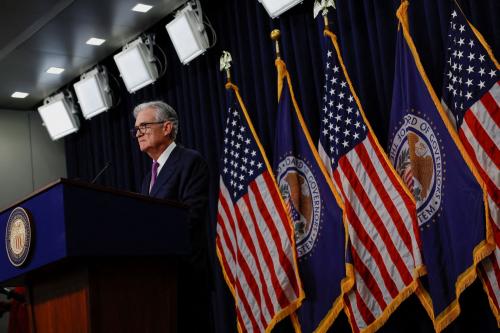Germany strengthens partnership with Africa under G-20 presidency
Last Friday, the Group of 20 finance ministers and bank governors met in Baden-Baden, Germany. The ministers and bank governors discussed the future of global trade, climate, and partnership with Africa, among other topics. Following German Chancellor Angela Merkel’s statement last October that her country would make Africa a priority during the German G-20 presidency, the group has actively aimed to promote the continent’s economy as a whole. African ministers and governors from Côte d’Ivoire, Morocco, Rwanda, Senegal, Tunisia, and South Africa were in attendance.
The communique from the March 17 meeting highlights the group’s intention to deepen and broaden the international economic and financial cooperation with African countries, within the scope of the African Union’s Agenda 2063. During the meeting, the finance ministers and bank governors expressed significant support to the recently launched Compact with Africa, a program created in the aim to foster private investment in infrastructure. Through this compact, the group will provide political support to African governments, international organizations, and bilateral partners in the aim to prepare comprehensive country-specific investment compacts to encourage private sector investment. To further strengthen the group’s collaborative relationship with the continent the G-20 Africa Partnership Conference will be held in Berlin in mid-June.
Beyond the G-20, the German government has been increasingly engaged in providing development assistance to African countries. In January, the German government unveiled its “Marshall Plan with Africa.” The plan has the double objective of increasing trade and development on the continent and reducing mass flows of cross-Mediterranean immigration from the continent. When presenting the blueprint, the Federal Minister for Economic Cooperation and Development Gerd Müller stated, “Africa’s fate is a challenge and an opportunity for Europe. If we do not solve the problems together, they will come to us at some point.” The strategy for this plan is a collaborative one, symbolically shown in the name change from “the Marshall Plan for Africa” to “the Marshall Plan with Africa.”
South Africa’s oil sale and Nigeria’s oil revenues drop
This week, China Petroleum & Chemical Corporation (Sinopec) announced that it will be buying Chevron’s petroleum assets in South Africa for $900 million, subject to approval by regulators. Chevron has been divesting from its South African assets since 2014 after an unsuccessful bid to block plans for new fuel storage facilities in the country. The American company currently holds a 75 percent stake (the rest is held by local shareholders) in a business that includes both a lubricants-manufacturing facility in Durban and an oil refinery in Cape Town. Analysts have noted that Sinopec’s decision underscores China’s desire to make a stronger foray into international markets as profits at home drop.
In Nigeria, oil revenues continue to decline, the Office of the Accountant General of the Federation announced earlier this week, due largely to falling oil prices, from $49.57 to $44.74 per barrel last month. Attacks on oil pipelines in the Niger Delta have exacerbated the fall in revenues. Indeed, the office noted that sabotage has accounted for a drop in almost one-third of the country’s oil revenue (though recent talks have paused the attacks and output has almost returned to previous levels). Given the country relies on oil for two-thirds of its government revenue, this drop continues to compound the troubles of the country’s recent recession. Overall, distributable government revenues (income shared among the federal, state, and local government levels) dropped from N465.19 billion to N429.127 billion in the last month—a drop of almost $117.5 million.
Insecurity in Kenya’s Rift Valley
Last week, President Uhuru Kenyatta deployed 400 troops to Kenya’s Rift Valley to “deal with those who continue to threaten the lives of Kenyans.” In recent weeks, armed raiders—purportedly herders searching for grazing land and water—have committed dozens of killings as the region is facing an intense drought. However, local activists and some members of parliament argue that the violence is politically motivated and linked to the August 2017 elections: Many argue that some politicians are encouraging herders to seize land and livestock by force in order to displace their opponents’ supporters, satisfy their own voters, and make money from stolen animals.
Kenya has a history of electoral violence; four of its last six polls have led to some unrest. In the political instability following the 2007 vote, over 1,100 people were killed and 650,000 people were displaced. This week, President Kenyatta was campaigning in the Gusii region and blamed the leader of the Orange Democratic Movement, Raila Odinga, for instigating the post-election violence in 2007 and 2008. Although the International Criminal Court (ICC) investigated six political leaders, including President Kenyatta, over their roles in the electoral violence, charges were ultimately dropped due to a lack of evidence linking them to the crimes, in part due to witness interference and a lack of cooperation from the Kenyan government, according to the ICC Prosecutor Fatou Bensouda.




Commentary
Africa in the news: G-20 talks on Africa, oil news in Nigeria and South Africa, and Kenya’s domestic unrest
March 24, 2017